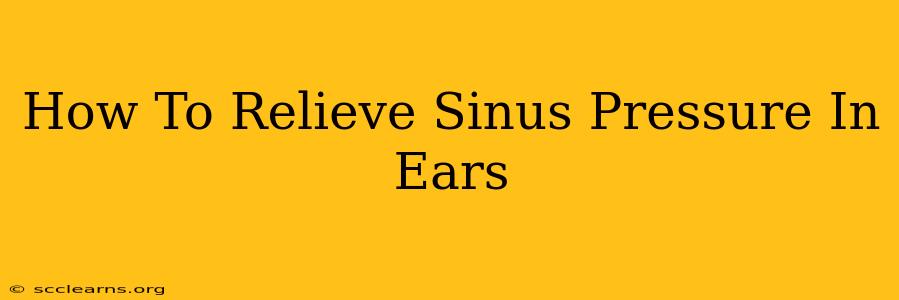Sinus pressure spreading to your ears can be incredibly uncomfortable, causing pain, fullness, and even muffled hearing. This often happens because your sinuses and ears are connected through the Eustachian tubes. When your sinuses are inflamed due to allergies, infection, or other factors, this pressure can build and radiate to your ears. Luckily, there are several things you can do to find relief. This guide will explore effective ways to relieve sinus pressure in your ears, offering both home remedies and when to seek professional medical attention.
Understanding the Connection: Sinuses and Ears
Before diving into solutions, it's important to understand the relationship between your sinuses and ears. Your Eustachian tubes are small tubes that connect the middle ear to the back of your nose and throat. These tubes help equalize pressure between your middle ear and the outside environment. When your sinuses are congested, the pressure can build up and affect the Eustachian tubes, leading to that unpleasant ear pressure.
Home Remedies for Sinus Pressure Relief in Ears
Several home remedies can help alleviate the discomfort:
1. Saline Nasal Rinse (Nasal Irrigation):
A saline nasal rinse is a simple yet effective way to clear nasal passages and reduce sinus pressure. Using a neti pot or squeeze bottle, gently rinse your nasal passages with a saline solution. This helps to flush out irritants and mucus, easing congestion and improving drainage. Ensure you use distilled or sterile water to prevent infection.
2. Steam Inhalation:
The moist heat from steam can help thin mucus and open up nasal passages. Inhale steam from a bowl of hot water (carefully, to avoid burns!), or take a hot shower. Adding a few drops of eucalyptus or peppermint essential oil can enhance the effect, but always proceed with caution and test for any allergic reactions beforehand.
3. Hydration:
Drinking plenty of fluids, especially water, is crucial for thinning mucus and making it easier to drain. Dehydration can worsen congestion, so staying hydrated is key to managing sinus pressure.
4. Over-the-Counter Medications:
Decongestants (oral or nasal sprays) can temporarily relieve congestion, but should be used sparingly as overuse can lead to rebound congestion. Pain relievers like ibuprofen or acetaminophen can help manage pain associated with sinus and ear pressure. Always follow the recommended dosage on the packaging.
5. Elevating Your Head:
Sleeping with your head elevated can help improve drainage and reduce pressure. Use extra pillows to prop yourself up.
6. Gentle Ear Pressure Release Techniques:
While not directly targeting the sinuses, gently attempting the Valsalva maneuver (holding your nose and gently blowing) or yawning can sometimes help equalize pressure in the Eustachian tubes. However, if you have an ear infection, avoid these techniques.
When to See a Doctor
While home remedies can often provide relief, it's important to seek professional medical attention if:
- Your symptoms worsen or persist for more than a week.
- You experience severe ear pain or a sudden loss of hearing.
- You have a fever or other signs of infection.
- You have a history of ear infections or other ear problems.
A doctor can properly diagnose the underlying cause of your sinus and ear pressure and recommend appropriate treatment, which may include antibiotics if an infection is present.
Preventing Future Episodes
Preventing sinus pressure and ear discomfort involves:
- Managing allergies: Identify and avoid allergens. Use allergy medications as needed.
- Practicing good hygiene: Wash your hands frequently.
- Quitting smoking: Smoking irritates the nasal passages and can worsen sinus problems.
- Staying hydrated: Maintain proper fluid intake.
By understanding the connection between your sinuses and ears, employing effective home remedies, and knowing when to seek professional help, you can effectively manage and alleviate sinus pressure in your ears, restoring comfort and well-being. Remember to always consult your doctor for diagnosis and personalized treatment plans.

